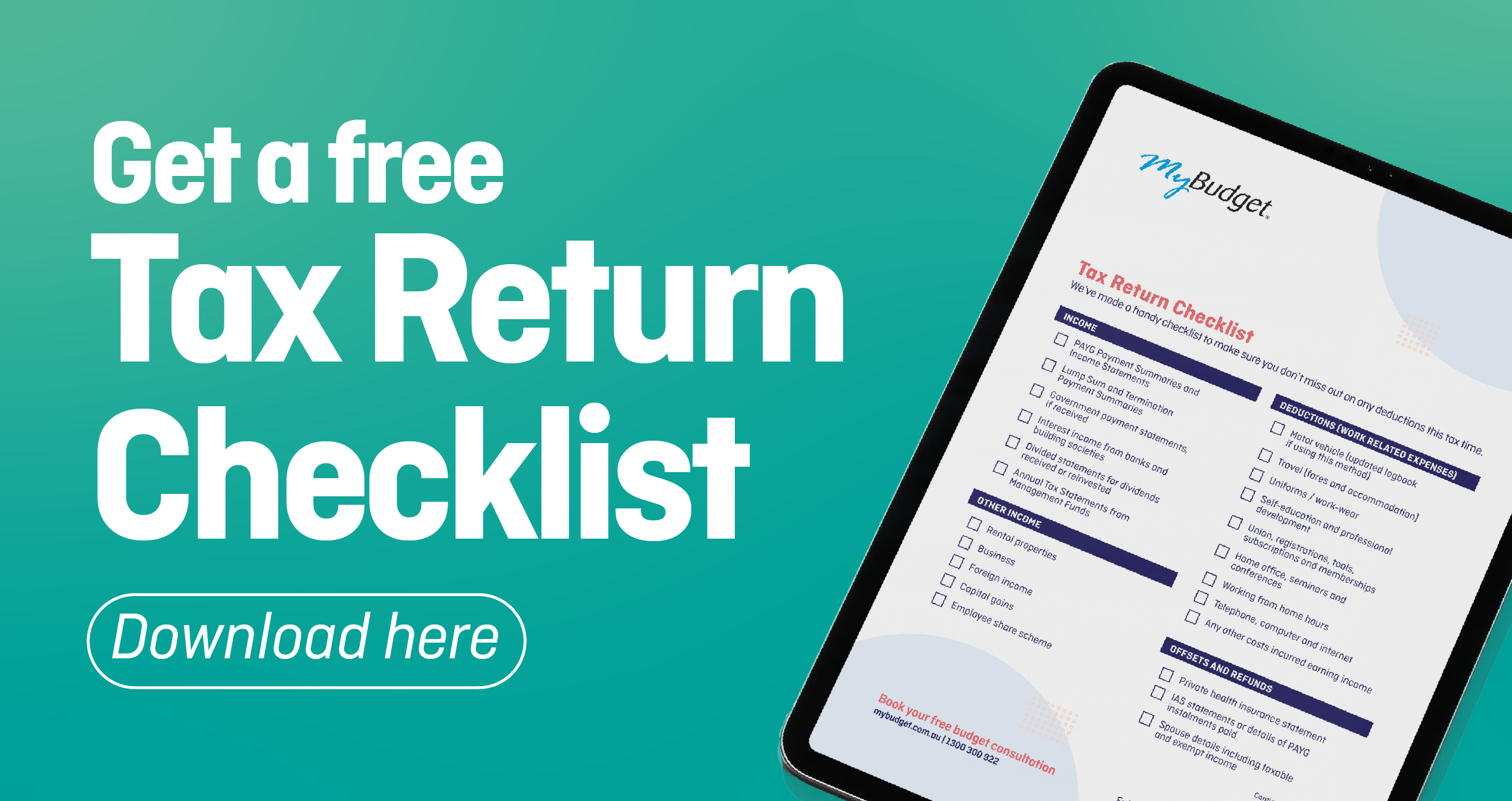What work-related expenses can I claim on my 2025 tax return?
Your quick guide to tax deductions, work-related expenses, and what the ATO (Australian Taxation Office) is watching in 2025, plus how to keep your taxable income low and your records audit-ready.
Tax time is near… but before you fire up the ATO app and start scrambling to scan a year’s worth of receipts, let’s talk about what you can actually claim when it comes to work-related expenses in 2025. Because while the temptation to claim your dog as a security guard might still be strong, the ATO won’t buy it!
Whether you’re an office worker, tradie, retail or hospitality worker, freelancer or sole trader, this guide will help you get across the latest rules on deductions, so you can maximise your tax return and reduce your taxable income, without attracting unwanted attention.
What are work-related deductions?
A work-related deduction is something you paid for yourself that directly relates to your income. But before you planning how to spend your tax refund, there are three non-negotiables:
- You must have spent the money yourself and weren’t reimbursed
- The expense must be directly related to earning your assessable income
- You must have a record to prove it (yes, receipts are still a thing).
These golden rules for work related tax deductions come straight from the ATO. Miss one, and your claim may knocked back, or you could potentially even face a tax audit.
6 Common work expenses you can claim in 2025
The ATO has clear categories for what counts as a legitimate work-related expense. Here’s what made the list this year:
1. Vehicle and work-related travel expenses
You can claim certain travel expenses on your tax return:
- driving between worksites or client locations (not commuting to your regular workplace)
- claim using either the cents per kilometre method or the logbook method depending on what applies to your work-related travel.
The cents per kilometre method uses a set rate (88 cents for 2024–25) multiplied by your work-related kilometres, up to 5,000 km per car. This rate covers everything: fuel, maintenance, insurance and depreciation, so no need to add extras.
The logbook method lets you claim a percentage of your actual car costs, based on a 12-week logbook of work-related travel. You’ll need to keep all your receipts and odometer readings, but it could work out better value if you use your car for work often.
Either way, keep clear records to back up your claim.
Reminder: you can’t claim Uber or taxi fares for daily commutes. Travel needs to be work-related; like an Uber to an offsite meeting.
2. Work-from-home expenses
You can claim work-from-home expenses against taxable income, following specific rules:
- for the 2024-2025 financial year, the fixed rate method is 70 cents per hour
- covers electricity expenses, internet expenses, phone usage, and stationery, but you’ll need a log of your hours
- alternatively, you can use the actual cost method if you have detailed records for all your additional expenses.
Don’t forget to hang onto your receipts and invoices. They’ll come in handy when you need to show the ATO that you’ve spent the money for those deductions on your tax return.
3. Clothing and laundry
You can claim tax deductions for washing your work uniforms, this includes:
- compulsory work uniforms, occupation-specific clothing, and protective clothing like hi-vis or safety boots
- laundry expenses for eligible clothing are also deductible. Check the full guide on work-related clothing and accessories.
Reminder: everyday or conventional clothing, even if you only wear it to work, is not tax deductible.
4. Tools and equipment
Tools you need to do your job, either as an employee or contractor can be a tax deduction, they include:
- items used directly in your job, like laptops, toolkits, scissors or software
- if the item costs over $300, you’ll need to claim depreciation over its effective life.
5. Self-education and training
- you can claim self-education expenses like courses, books, and travel, but only if they relate directly to your current employment duties and not a new career.
6. Charitable donations
- donations over $2 to a deductible gift recipient (DGR) are tax deductible. For bucket donations under $10, no receipt is needed
- add your regular charitable donations, like child sponsorships, to your tax return. Just remember to keep those receipts as proof.

6 Overlooked work-related expenses you might be able to claim
Some tax deductions don’t make the ATO’s top-of-mind list, but that doesn’t mean they aren’t legitimate deductions. If you’re eligible and keep detailed records, here are a few lesser-known work-related deductions worth checking:
1. Rental property extras
- covers cleaning expenses, gardening, pest control, and agent fees for managing your rental property
- don’t forget capital works deductions for structural items like fences or sheds.
2. Mobile and internet use
- if you use your personal phone or internet for work-related purposes, you can claim the work-related percentage of those costs.
Reminder: only the work-related portion of your internet expenses is deductible. Keep a diary for a four-week period to work it out.
3. Work bags
- handbags, satchels or backpacks used exclusively to carry tools or tech for work are often deductible expenses.
4. Job-related events
- attending events, media launches or functions as part of your work duties? Associated costs might be tax deductible.
Reminder: just attending a work dinner or social event isn’t enough, you need to prove the event relates to your role.
5. Professional software and subscriptions
- fees for memberships, unions, software and subscriptions can be claimed.
6. Income protection insurance
- you can claim premiums on insurance that covers loss of income, but not life or trauma insurance. It’s worth noting, if your superannuation fund pays for income protection insurance, it can’t be claimed on your tax return.

What can’t you claim in 2025?
Tempted to claim your daily almond latte or the new trainers you wore to the office? Think again. Here’s what the ATO says no to:
- travel to and from your regular workplace
- meals, snacks or coffee
- haircuts, grooming or makeup
- childcare or school fees
- fashion or conventional clothing.
Should I keep receipts? Yes, it still matters
To substantiate your claims, you’ll need accurate records such as:
- receipts (paper or digital)
- invoices or bank statements
- work-from-home logs.
The ATO’s myDeductions tool can help reduce the burden of record keeping and is especially useful if you plan to use a tax agent or myTax to lodge.
How much can I claim without receipts?
You can claim up to $300 of work-related expenses without formal receipts if the expenses are reasonable and clearly connected to your work. You still need some form of alternative evidence, like:
- bank or card transactions
- diary entries
- rosters or written explanations.
You can also claim:
- work items under $10 each (up to a total of $200)
- small stationery items
- laundry expenses using the ATO’s standard deduction method.
Can you claim a designer handbag? It depends…
If your handbag or briefcase is purely for work, like carrying your laptop or files, it may be deductible. But the price matters.
Under $300?
You can usually claim the full amount in the same financial year.
Over $300?
You’ll need to claim the cost over time as it depreciates, and keep clear records of work-related use.
Claiming something high-end like a Louis Vuitton? You’ll need to prove it’s a genuine business necessity, not just a stylish splurge.
Reminder: a designer label doesn’t make a bag tax deductible. The ATO looks at what it’s used for, not how it looks.
ATO’s focus areas for tax time 2025
1. Work-related expenses
Claims that are inflated, personal in nature or not tied to earning assessable income
2. Working from home deductions
Incorrect use of the fixed rate method or actual cost method, and lack of records.
3. Multiple income sources
Side hustles, gig work, rental income or digital platforms must all be declared.
What could get you flagged by the ATO for a tax audit?
The ATO has advanced data-matching tools that compare your claims to others in your industry. What triggers an ATO tax deduction review?
- claims that are significantly higher than average
- rounding everything to the nearest hundred dollars
- work-from-home hours that don’t match your employment pattern.
In short: claim what you’re entitled to, but make sure you can prove it.
Getting your tax deductions right in 2025
Getting your tax return right in the 2024–2025 financial year comes down to three things: knowing the rules, keeping detailed records, and staying honest. Make sure every claim is linked to your work-related activities and backed by proof, even if you’re using the simplified methods.
If something doesn’t feel right or you’re unsure, don’t wing it, check the ATO’s website or give them a call. A little extra effort now could save you a headache (or penalty) later, and set you up for smoother, smarter tax time for years to come.
Tax return estimator
Want a rough idea of how much you might get back (or owe) this year? Try the ATO’s Income Tax Estimator to help estimate your refund or debt for the 2024–25 income year.
You can also check the current 2025 tax rates to see how they’ll apply to your income this year.
Do you want to feel more confident about your budget beyond June 30? That’s where we come in.
How can MyBudget help at tax time?
MyBudget can help you get organised, stay on top of bills, and feel confident when it’s time to lodge your tax return.
Chat with MyBudget or call us on 1300 300 922 and we’ll help you budget smarter, plan for tax time, and make real progress towards your financial goals.



